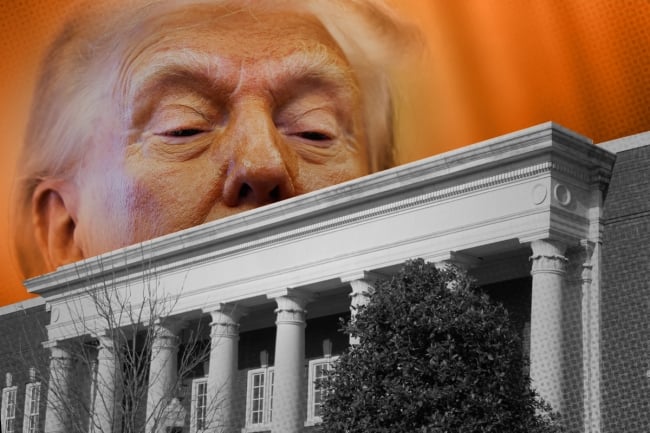You have /5 articles left.
Sign up for a free account or log in.

In a new AP-NORC survey, only around 3 in 10 respondents said they favor things like taxing universities and freezing universities’ federal funds.
Photo illustration by Justin Morrison/Inside Higher Ed | Anna Moneymaker/Getty Images | DenisTangneyJr/iStock/Getty Images
The majority of Americans disagree with President Donald Trump’s punitive actions toward universities, including cutting billions in federal funding and threatening to revoke Harvard’s tax-exempt status, according to a new survey from The Associated Press-NORC Center for Public Affairs Research (AP-NORC).
Just 27 percent of the 1,175 participants in the survey, which was conducted from May 1 to 5, reported that they favor the president’s strategy of withholding federal funds from universities that don’t comply with certain demands. Forty-five percent, meanwhile, said they oppose the withholding of funds, while another 26 percent said they neither oppose nor favor the funding freezes. Removing universities’ tax-exempt statuses was also unpopular, with 30 percent favoring doing so.
In both cases, the action was more favorable among Republicans, with 51 percent supporting funding freezes and 49 percent supporting the removal of tax-exempt status.
Most Popular
The survey, which also included questions to gauge Americans’ broader perceptions of higher education, comes amid the Trump administration’s ongoing pressure campaign against higher education, which has included freezing federal funds to universities, eliminating a swath of research grants, threatening institutions with higher endowment taxes, launching various federal investigations into universities, and more.
Overall, according to AP-NORC, only 41 percent of Americans approve of how Trump is faring as president just over 100 days into his second term; about the same share, 42 percent, approve of how he is handling issues related to higher education. Those with college degrees are more likely to disapprove of the president, at 63 percent, versus 53 percent of those without a college degree.
Respondents also tend to disagree with Trump’s stance on many of the initiatives that conservatives say fall under the label of diversity, equity and inclusion. Forty-eight percent said they favor support services for underrepresented groups, while only 15 percent said they oppose such services. Even among Republicans, 38 percent favor those services and 28 percent oppose them.
Scholarships for underrepresented groups, as well, were relatively popular, with 45 percent favoring them and 19 percent opposing them. Although these scholarships were less popular among Republican respondents—with 25 percent for and 35 percent against—39 percent of those surveyed said they didn’t feel strongly either way.
But when the survey specifically asked about “diversity, equity and inclusion programs,” Republicans felt much more strongly, with 60 percent saying they disapproved. (Sixteen percent said they favor such programs.)
Americans’ top concerns about higher education also don’t seem to line up with the Trump administration’s. Fifty-eight percent said they were “extremely concerned” about the cost of tuition while 38 percent said the same about antisemitism on campus and 36 percent were extremely concerned about liberal bias on campus.
Republicans were more likely to be concerned about both antisemitism and liberal bias. The issue of least concern to respondents was the revocation of international students’ visas, though 59 percent of Democrats expressed extreme concern about the revocations.
The survey also asked about how universities impact society, and more than three in five respondents said that both scientific research and innovative technologies that come out of universities have a positive effect on society. That lines up with the result showing that 62 percent of respondents—including 75 percent of Democrats and 57 percent of Republicans—approved of maintaining funding to scientific research at universities.




